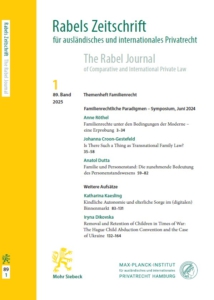Views
The Greek Supreme Court has decided: Relatives of persons killed in accidents are immediate victims
A groundbreaking judgment was rendered last October by the Greek Supreme Court. Relatives of two Greek crew members killed in Los Llanos Air Base, Spain, initiated proceedings before Athens courts for pain and suffering damages (solatium). Although the action was dismissed by the Athens court of first instance, and the latter decision was confirmed by the Athens court of appeal, the cassation was successful: The Supreme Court held that both the Brussels I bis Regulation and the Lugano Convention are establishing international jurisdiction in the country where the relatives of persons killed are domiciled, because they must be considered as direct victims.
THE FACTS
On 26 January 2015, an F-16D Fighting Falcon jet fighter of the Hellenic Air Force crashed into the flight line at Los Llanos Air Base in Albacete, Spain, killing 11 people: the two crew members and nine on the ground.
The relatives of the Greek crew members filed actions for pain and suffering damages before the Athens court of first instance against a US (manufacturer of the aircraft) and a Swiss (subsidiary of the manufacturer) company. The action was dismissed in 2019 for lack of international jurisdiction. The appeals lodged by the relatives before had the same luck: the Athens court of appeal confirmed in 2020 the first instance ruling. The relatives filed a cassation, which led to the judgment nr. 1658/5.10.2022 of the Supreme Court.
Standard (and burden) of proof for jurisdiction agreements
Courts are often required to determine the existence or validity of jurisdiction agreements. This can raise the question of the applicable standard of proof. In common law jurisdictions, the question is not free from controversy. In particular, Stephen Pitel has argued on this very blog that jurisdiction clauses should be assessed on the balance of probabilities, as opposed to the “good arguable case” standard that is commonly applied (see, in more detail, Stephen Pitel and Jonathan de Vries “The Standard of Proof for Jurisdiction Clauses” (2008) 46 Canadian Business Law Journal 66). That is because the court’s determination on this question will ordinarily be final – it will not be revisited at trial.
China’s Draft Law on Foreign State Immunity—Part II
Written by Bill Dodge, the John D. Ayer Chair in Business Law and Martin Luther King Jr. Professor of Law at UC Davis School of Law.
In December 2022, Chinese lawmakers published a draft law on foreign state immunity, an English translation of which is now available. In a prior post, I looked at the draft law’s provisions on immunity from suit. I explained that the law would adopt the restrictive theory of foreign state immunity, bringing China’s position into alignment with most other countries.
In this post, I examine other important provisions of the draft law, including immunity from attachment and execution, service of process, default judgments, and foreign official immunity. These provisions generally follow the U.N. Convention on Jurisdictional Immunities of States and Their Property, which China signed in 2005 but has not yet ratified.
China’s draft provisions on immunity from attachment and execution, service of process, and default judgments make sense. Applying the draft law to foreign officials, however, may have the effect of limiting the immunity that such officials would otherwise enjoy under customary international law. This is probably not what China intends, and lawmakers may wish to revisit those provisions before the law is finally adopted. Read more
News
New issue alert: RabelsZ 89(2005)
 Issue 1/2025 of RabelsZ has just just been released. It contains the contributions to a family law symposium held at the Max Planck Institute in Hamburg in June 2024. All content is Open Access: CC BY 4.0 and more articles are available Online First.
Issue 1/2025 of RabelsZ has just just been released. It contains the contributions to a family law symposium held at the Max Planck Institute in Hamburg in June 2024. All content is Open Access: CC BY 4.0 and more articles are available Online First.
Anne Röthel, Preface to this family law special, pp. 1–2, https://doi.org/10.1628/rabelsz-2025-0003
AMEDIP’s upcoming webinar: Private International Law in the Inter-American system: A glance in the light of the 50 anniversary of the CIDIP (27 February 2025 – in Spanish)

The Mexican Academy of Private International and Comparative Law (AMEDIP) is holding a webinar on Thursday 27 February 2025 at 14:30 (Mexico City time – CST), 21:30 (CET time). The topic of the webinar is ‘Private International Law in the Inter-American system: A glance in the light of the 50 anniversary of the CIDIP’ and will be presented by OAS Director Dante Negro (in Spanish).
CIDIP is the Spanish acronym for the Inter-American Specialized Conferences on Private International Law. For a history of the CIDIP, click here. Read more
Book Launch: Philosophical Foundations of Private International Law – Oxford, March 19, 4pm-6pm
In 2024, Oxford University Press published Philosophical Foundations of Private International Law, edited by Roxana Banu, Michael S Green, and Ralf Michaels. The book represents the first inter-disciplinary engagement with questions of private international law from a philosophical perspective, covers a wide range of philosophical questions in private international law and brings philosophers in conversation with private international law scholars to demystify the analytical tools of each discipline in relationship to the other. More information on the book, including a table of contents, is here.
Now, Oxford University is organizing a hybrid book launch on March 19, 4pm-6pm. An introduction from the Editors will be followed by a discussion on key themes by Gabriel Encinas, Verónica Ruiz Abu-Nigm, Robert Stevens, Antonios Tzanakopoulos, and Emmanuel Voyiakis. More information on the event and on how to sign up for physical or virtual participation is here.


